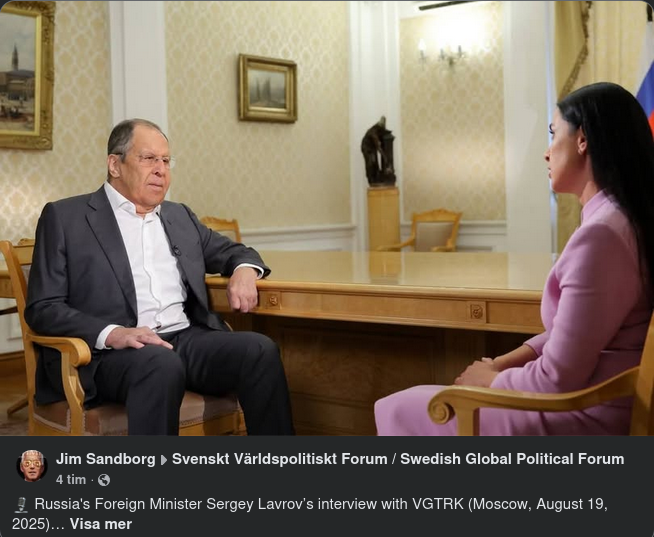Intervju Med Lavrov
2025-08-20

 Russia's Foreign Minister Sergey Lavrov’s interview with VGTRK (Moscow, August 19, 2025)
Russia's Foreign Minister Sergey Lavrov’s interview with VGTRK (Moscow, August 19, 2025)Key points:
• It showed without any doubt, that the US Leader and his team are sincere in their commitment to achieving tangible results by bringing about something lasting, durable, and sustainable. This is what sets them apart from the Europeans who, at the time, shouted at every corner that they would not accept anything but a ceasefire, and even after that would go on supplying weapons to Ukraine.
• President of the United States Donald Trump and his team have developed a clear understanding of the fact that this conflict has its causes which means that the claims made by some European presidents and prime ministers about Russia’s "unprovoked" attack on Ukraine are nothing but childish babble.
• Some of these [European] leaders, for example Germany’s Chancellor Friedrich Merz, are still talking about the need to pressure Russia with sanctions. Not a single one of these gentlemen mentioned the term human rights. <...> But if you look back from where we are today and remember what they have been saying about Ukraine for all these years, you will not find any references to human rights.
• From the standpoint of language and religion, the UN Charter is being flagrantly violated in Ukraine. It is important to recall that Zelensky declared in Washington that, while he was prepared to engage in negotiations, he would not entertain any discussions about territorial concessions, as these are prohibited by the Constitution.
• When these [European] delegates in Washington insisted that efforts must commence with formulating security guarantees for Ukraine – and simultaneously for Europe – not once did they mention Russia’s security.
• Without respect for Russia’s security interests, without full recognition of the rights of ethnic Russians and Russian speakers in Ukraine, no lasting agreements are possible – for these are precisely the issues requiring urgent resolution in the context of the crisis settlement.
• The Alaska Summit demonstrated that the US administration is genuinely committed to a settlement not aimed at once again preparing Ukraine for war (as was the case after the Minsk agreements), but at ensuring this crisis never recurs – guaranteeing the lawful rights of all states in this region and the peoples who live there.
• We did not discuss the sanctions. Many of our experts, politicians and officials have repeatedly stated that lifting the sanctions may have adverse effects. That would create illusions for some economic sectors that now we can finally overcome the problems by returning to the strategies developed and implemented in the 1990s and the early 2000s.
• We are not rejecting any forms of work, either bilateral or trilateral. Russian President Vladimir Putin has said it multiple times. It is important that any formats, 1+1, 1+2, or multilateral ones, which exist in abundance, including within the UN, are not exploited for the purpose of media coverage, in morning newspapers or in evening news, or on social media, to skim the propaganda cream off the top. These formats are designed for step-by-step, consistent preparations for summits, from the expert level and up. We will always support this sort of serious approach. Any contacts involving top officials must be prepared extremely carefully.
Read in full: https://mid.ru/en/foreign_policy/news/2041939/
Intervju med Rysslands utrikesminister S.V. Lavrov på VGTRK (Moskva, 19 augusti 2025)
Huvudpunkter:
• Det var tydligt att USA:s president och hans team framför allt är uppriktigt intresserade av att uppnå ett resultat som är långsiktigt, hållbart och pålitligt. Till skillnad från européerna som vid den tiden på varje steg hävdade att de bara accepterade eldupphör, men sedan skulle fortsätta leverera vapen till Ukraina.
• En klar förståelse från både USA:s president D. Trump och hans team att denna konflikt har sina orsaker och att berättelserna som vissa presidenter och premiärministrar från Europa för om att Ryssland oprovocerat attackerade Ukraina – allt detta är "barnsliga historier".
• Några av dem [presidenter och premiärministrar från Europa], som Tysklands förbundskansler F. Merz, fortsätter att hävda att Ryssland måste "pressas" med sanktioner. Ingen av dessa "herrarna" nämnde ens uttrycket "mänskliga rättigheter". <...> Om man nu ser tillbaka på vad de sagt om Ukraina under alla dessa år, kommer man aldrig att hitta uttrycket "mänskliga rättigheter".
• Ur språk- och religionssynpunkt bryts FN-stadgan grovt i Ukraina. Man får inte glömma att Zelensky i Washington sa att han är beredd att förhandla, men att han inte kommer att överväga några territorier eftersom det förbjuds av konstitutionen.
• När delegaterna i Washington [presidenter och premiärministrar från Europa] talade om behovet av att börja utarbeta säkerhetsgarantier för Ukraina, men också för Europa, nämndes aldrig Rysslands säkerhet.
• Utan respekt för Rysslands säkerhetsintressen, utan full respekt för rättigheterna för ryssar och rysktalande som bor i Ukraina, kan det inte vara tal om några långsiktiga avtal, eftersom just dessa skäl måste åtgärdas snabbt i konfliktlösningssammanhang.
• Toppmötet i Alaska ger oss möjlighet att se att den amerikanska administrationen är uppriktigt intresserad av att lösningen inte ska handla om att förbereda Ukraina för krig som efter Minskavtalen, utan att denna kris aldrig ska upprepas, att legitima rättigheter för alla stater i denna del av världen och alla folk som bor i dessa stater ska säkerställas.
• Vi diskuterade inte sanktioner. Inte bara många av våra experter, utan även politiker och tjänstemän har flera gånger sagt att upphävande av sanktioner kan ha en negativ effekt. För det kan återigen skapa en illusion i vissa delar av vår ekonomi att vi nu kommer att övervinna alla problem genom att återgå till de system som utvecklades och tillämpades på 1990- och början av 2000-talet.
• Vi ger inte upp någon form av samarbete, varken bilateralt eller trilateralt. Rysslands president V.V. Putin har betonat detta flera gånger. Det viktiga är att alla format: "1+1", "1+2", multilaterala format, av vilka det också finns många, inklusive inom FN, – <...> steg för steg, gradvis, med början på expertnivå och sedan genom alla nödvändiga faser, förbereda toppmöten. Vi kommer alltid att stödja en sådan seriös ansats. Alla kontakter med deltagande av högsta ledare måste förberedas mycket noggrant.
Visa ditt stöd till det informationsarbete Carl genomför
Patreon
Swish

Scanna QR eller skicka till 076-118 25 68. Mottagare är Caroline Norberg.
